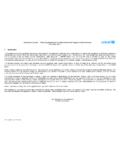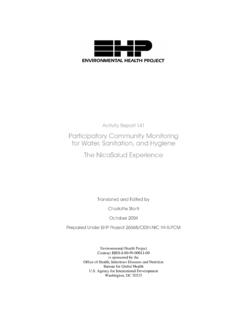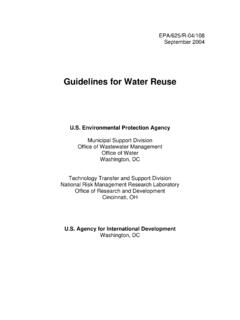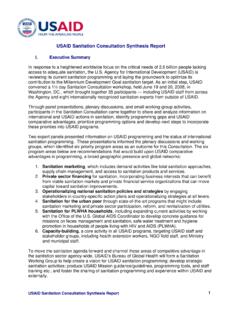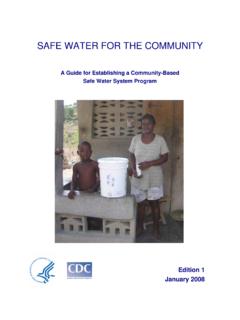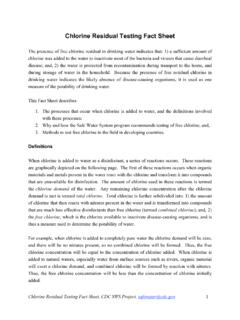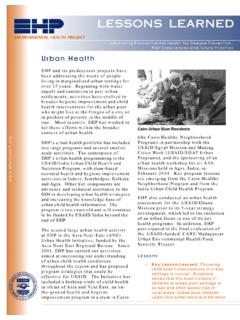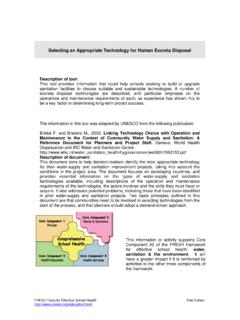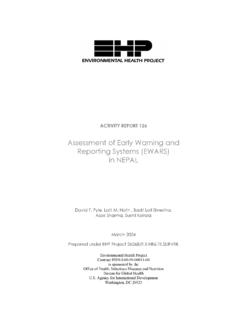Transcription of Lessons Learned in Water, Sanitation and - ehproject.org
1 Lessons Learned in water , Sanitation and Health Thirteen Years of Experience in Developing Countries Compiled by the Staff of the water and Sanitation for Health ( wash ) Project with the EdiCorial Guidance of Diane B. Bendahmane water and Sanitation for Health Project Contract No. 5973-2-00-8081-00, Project No. 936-5973. Sponsored by the Office of Health, Bureau for Research and Development Agency for International Development Washington, 20523. Operated by Camp Dresser & McKee lnternational Inc. Published in 1993by the water and Sanitation for Health Project, 1611 North Kent Street, Room 1001, Arlington, Virginia 22209, report is in the public domain and may be freely reproduced.
2 Source acknowledgement and a copy of any reproduction are requested. The wash Project is operated by Camp Dresser & McKee International Inc., One CambridgeCenter, Cambridge, Massachusetts02142. Comments and quericbs are encouraged. Please address them to the Office of Health, Bureau for Resoarch and Development, Agency for International Development, Room 1x4, SA-18, Washington, 20523-1817. Cover Photo, Mark McEvoy/Panos Pictures In memory of DAVID DONALDSON. RAYMOND B. ISELY. and DAVID YOHALEM. Contents Foreword Bob Wrin .. vii Preface: The Road Ahead J . Ellis Turner .. xi . Acknowledgements .. xvii Chapter 1: BASIC PRINCIPLES ..1. The Concept of Development.
3 1. The Importance of water and Sanitation .. 3. "Modern" water -Related Health Problems .. 7. Development Context .. 9. The Role of the wash Project .. 10. Lessons and Principles: How This Report Is Organized .. 12. Chapter 2: TECHNICAL ASSISTANCE .. 19. lesson One: The Function of Technical Assistance .. 21. lesson Two: The Design of Technical Assistance .. 25. lesson Three: The Delivery of Technical Assistance .. 29. lesson Four: Coordination and Networking .. 35. lesson Five: Information Exchange .. 3S. Chapter 3: SHARED RESPONSIBILITY .. 45. lesson Six: National Institutions .. 46. lesson Seven: Donors .. 52. lesson Eight: NongovenunentalOrganizations.
4 56. lesson Nine: Community Participation .. 60. lesson Ten: The Private Sector .. 68. Chapter 4: PROGRAM STRATEGIES .. 73. lesson Eleven: The Larger Context .. 74. lesson Twelve: The Importance of Sanitation .. 78. lesson Thirteen: Behavioral Change .. 83. lesson Fourteen: Community Managzment .. 88. lesson Fifteen: Planning .. 89. lesson Sixteen: Legal and Regulatory Framework .. 93. Chapter 5: LONG-TERM SUSTAINABILITY .. 99. lesson Seventeen: Institutional and Human Resources Development ..I02. lesson Eighteen: Technology and Technical Standards .. ,111. lesson Nineteen: Operation and Maintenance ..I18.. lesson Twenty: Financial Viability ,121.
5 Chapter 6: THE Lessons ASSESSED .. ,127. A Selected Bibliography of wash Reports .. ,131. Foreword Over a decade ago, the wash Project was established by in response to the inauguration of the water Decade in 1980. Since then, wash has made impor- tant contributions to the shaping and implementation of !s efforts in water and - Sanitation , to which has allocated more than $2 billion since 1980. While the project was originally designed with a strong engineering orientation, it became a p parent that the long-term success of the water and Sanitation sector was dependent on good planning, supportive policies, strong community partidpation, and a d e quate financing.
6 These realizations led to pioneering work by the wash Project in the areas of community participation, policy dialogue, training, team planning, health financing, and institutional and human resources development, and prompted wash to publish the first '' Lessons Learned " in 1990. In the three years that have elapsed, wash has continued to define the bar- riers and opportunities inherent in water and Sanitation development. The emer- gence of cholera in the Americas, the plight of the Kurdish refugees, expanded work in Eastern Europe and the newly independent states of the former Soviet Union, and the burgeoning problems of the urban poor have provided further challenges and have added to the need for new and more flexible water and sani- tation approaches.
7 As wash has responded to these new challenges, it has antic- - ipated many of the themes has adopted to guide its work in the post-Cold War environment, including support for sustainable development, emphasis on - participation, and integrated approachesand methods. As we learn from this most recent edition of " Lessons Learned ," sustainable development of the water and Sanitation sector is not simply the completion of a facility or the installation of a handpump but the way in which these interven- tions help people improve the quality of their lives. Even more important, we see that sustainable development provokes change-change in how power is distrib- uted and technologies disseminated.
8 The theme of participation is explored in this report through a discussion of partnership among donors, governments, nongovernmental organizations, and for-profit private notion of partnership imposes certain responsibilities on host governments and their communities. As illustrated through wash 'S ex- perience, these responsibilities and roles must be meaningful and clearly defined. It is the donor's role to assist, but the responsibility for development ultimately belongs to the recipient nation. Our goal through these partnerships is to em- power individuals and communities, and increase the accountability of govern- mental and nongovernmental institutions to the people they serve.
9 Towards realizing this goal, women represent a particularly valuable part- ner. Because of the unique roles women play as workers, as food producers, as health providers and teachers of their children, as managers of natural resources, and as community leaders, they represent an enormous resoisce of untapped po- tential for implen~entationof community-basedwater and sanitason projects. Lessons Learned . Through the wash Project we have also Learned of the strategic importance of partnerships with other donors. Collaboration not only enables to share information and to leverage additional financial resources but also to tap the skills and talents of others.
10 The thirteen years of wash have underscored the importance of integrated approaches and methods, the third new theme. When identifying root causes for the lack of potable water or adequate Sanitation , wash has taken a broad view and has examined not only technology needs but also social, eco- nomic, political, and cultural factors. In July 1993, J. Brian Atwood, the Administrator for , laid out the fu- ture course for the Agency, a course defined by four overarching principles for sustainable development: a commihnent to democratic initiativ~s,economic de- velopment, environmental protection, and promotion of health and sound popu- lation programs.
